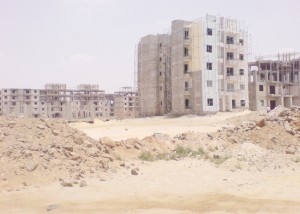
(DNE Photo)
Egypt’s government has handed over “only 57 residential units” to citizens from its “one million residential units” project, an Egyptian Initiative for Personal Rights (EIPR) study stated.
The government delivered just 11% of its project target in fiscal years (FY) 2012/13 and 2013/14, according to the EIPR.
The study, published on Sunday, also looked in depth into the 1m residential units project or the “social housing project” that was announced by Mubarak’s last housing minister, Ahmed Al-Maghrabi. The project was initially announced during the 25 January Revolution, urging people to apply, but the minister made no mention of conditions.
The post-revolution government announced the project’s implementation in July 2012. The national project is expected to provide 1m residential units. Construction was projected to last five years, from fiscal year (FY) 2012/13 to FY 2016/17, with an average of 200,000 units expected to be constructed per year.
According to the study, the number of applications had exceeded 6 million requests in August 2011, the government said at that time, closing the application phase. The period of the project was five years, with the units to be built by the public sector.
The Supreme Council of the Armed Forces (SCAF) had directly supported the project after its announcement, as the Engineering Corps had built the first phase, 160,000 units in 2012.
The study criticised that after three years of adopting the project, some details remained undefined. These include: the number of units that will be established in each governorate; how many units will be established each year; the percentage of implementation; and the specifications of the units.
According to the study, the project’s implementation is going “at a very slow rate”, highlighted by only 57 units of the project being handed to citizens. This is out of 13,000 units that should have been handed over as a first phase of the project.
The budget allocation for the project in FY 2014/15 state budget amounts to EGP 9.5bn in total.
In November 2014, the Social Housing Fund was established, under the Ministry of Housing, and is responsible for imposing the general policies of constructing and managing the units. It will also be responsible for financing the project from the budget allocations and sales revenues.
This project was preceded by a 2005 Mubarak national housing project, which aimed to provide low-income citizens with 500,000 units over six years, with the participation of the private sector. However, the project was not finished as only 1,000 units were completed as of February 2014, according to the study.
In a previous study published in April, the EIPR said that the eligibility regulations to apply for a residential unit in the social housing programme prevent 50% of the lowest-income Egyptians from qualifying.
The government announced, in early 2014, several regulations that make citizens eligible to apply for owning and renting units. The regulations stated that owning an apartment requires a maximum family income of EGP 40,000 per year, which is earned by approximately 10% of Egyptians, and a minimum income of EGP 23,040 a year. For renting a residential unit, the family’s maximum income was set at EGP 18,000 a year.
The top 10% of Egyptians took in an average yearly income of EGP 42,789, while the minimum income of a middle class family stood at EGP 23,097 in FY 2012/23, according to the Central Agency for Public Mobilization and Statistics’ (CAPMAS).



